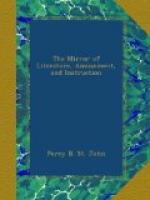That is, according to my reading, ’fat as thou art, thou wouldst be duller than the fat weed of Lethe if you did not bestir yourself in this business.’ Observe, too, with what propriety Shakspeare has here employed the word ‘stir,’ it being a well-known fact that corpulent persons have a strong disinclination to locomotion. And Hamlet himself, (in his interview with Rosencrantz and Guildenstern,) makes a pointed allusion to the indolence and lethargy which so commonly accompany obesity. ‘I have of late,’ he says, ’but wherefore I know not, lost all my mirth, foregone all custom of exercises, and, indeed, it goes so heavily with my disposition,’ &c. &c. Now what is this, I would fain know, if it be not the natural complaint of a man suffering under the oppression of too much flesh? or, as he afterwards expresses it, with another allusion to his fatness, ’to grunt and sweat, under a weary life?’ You have quoted the language of Ophelia in support of the common notions with regard to the personation of this character; but you forget the remarkable expression she uses when describing to her father the unexpected visit of ‘Lord Hamlet,’ while she was ’sewing in her closet:
’At last, a little shaking of mine
arm,
And thrice his head thus waving up and
down,
He raised a sigh so piteous and profound,
As it did seem to shatter all his
bulk,
And end his being.’
What say you to this?—His bulk! The sigh was so profound, that it seemed to shatter even his bulk! I fancy I might rest my case here, and win my wager, eh? But I am too skilful a general to throw away my strength at the beginning of a battle. If I have not already beaten you from your last strong hold—from your last defence—I have a corps de reserve, which will at once decide the victory. You remember the concluding scene, I suppose—the fencing bout between Hamlet and Laertes? What do you think of the following little bit of dialogue?
’Laertes.—A touch—a touch,—I do confess. King.—Our son shall win. Queen.—He’s fat and scant of breath. Here, Hamlet, take my napkin—rub thy brows ——Come, let me wipe thy face!’
Do you not imagine you see the pursy Prince, purring and blowing and sweating with the exertion he had made, and ‘larding the lean earth,’ like another Falstaff almost? Nay, the very words, ’Come let me wipe thy face,’ are addressed by Doll Tearsheet to Falstaff, when he was heated by his pursuit of Pistol:—’Alas, poor ape, how thou sweatest! Come, let me wipe thy face.’ Hem!” (quoth Mr. Henry Augustus Constantine Stubbs) “I have done—and pause for a reply.”
“You’ll be horribly laughed at,” said McCrab, “if you do make Hamlet a fat little fellow.”
“Shall I?” exclaimed Stubbs, with a contented chuckle, and rubbing his hands “shall I be horribly laughed at?”




